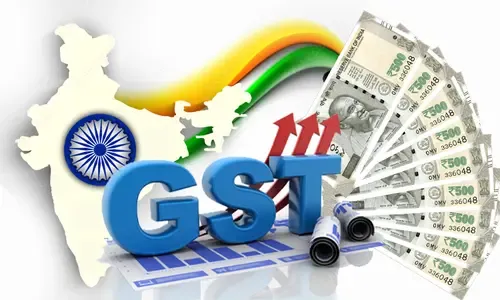Has GST collection achieved double-digit growth in the April-June quarter?

Synopsis
Key Takeaways
- 10.7% increase in average monthly net GST collection.
- Current collection stands at Rs 1,80,774 crore.
- Exemptions for small businesses based on turnover.
- Composition levy scheme aids small taxpayers.
- Measures taken to control inflation and enhance supply.
New Delhi, July 29 (NationPress) The average monthly net GST collection has surged by an impressive 10.7 percent to Rs 1,80,774 crore in the first quarter (April-June) of the current fiscal year 2025-26. This is a notable increase from the average monthly net GST collection of Rs 1,63,319 crore recorded during the same quarter last year, as reported by the Minister of State for Finance, Pankaj Chaudhary, in a parliamentary session.
The government has implemented several initiatives based on the GST Council's recommendations aimed at uplifting the small business sector, as stated by the minister in a written response to questions in the Rajya Sabha.
Among these initiatives is the exemption for small and medium enterprises from the obligation to acquire GST registration when their aggregate turnover in a financial year remains below Rs 40 lakh (or Rs 20 lakh for certain special category states) for intra-state taxable supply of goods.
Moreover, individuals engaged in intra-state or inter-state taxable supply of services are also exempt from GST registration if their financial year turnover does not exceed Rs 20 lakh (or Rs 10 lakh for specific special category states).
The composition levy scheme under GST offers a straightforward tax framework tailored for small and medium taxpayers whose turnover is within the specified limits. A flat tax rate of 1 percent (0.5 percent under the CGST Act and 0.5 percent under the respective SGST Act) applies to goods traders and manufacturers, while a rate of 2.5 percent is applicable for restaurant supplies under each Act.
Eligible registered entities with an annual turnover up to Rs 5 crore from the previous financial year can choose to file quarterly returns along with monthly tax payments.
Additionally, the minister highlighted a series of administrative actions, including fiscal and trade policies, aimed at controlling inflation and alleviating its effects. These measures encompass increasing buffer stocks for essential food items and strategically selling procured grains in the open market to enhance supply and reduce prices.
Furthermore, measures to facilitate imports and impose export restrictions during shortages, alongside the application of stock limits to boost the supply of selected commodities in the market, have also been undertaken by the government, as noted by the minister.





